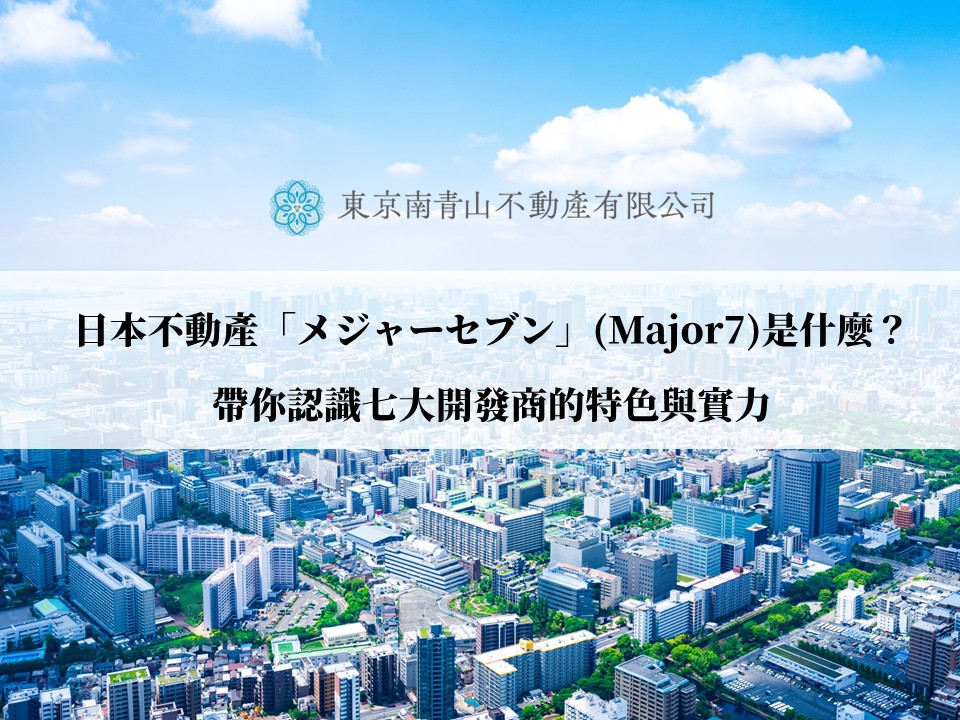— Understand the Japanese Logic Behind Home Buying to Avoid the Three Most Common Pitfalls
Japan’s real estate market has long been known for its price stability and steady rental yields. Combined with a low-interest rate environment, a mature market, and relatively transparent transaction processes, many overseas investors view Japanese property as a reliable option for asset allocation.
Especially in major metropolitan areas like Tokyo and Osaka, Japanese real estate remains one of the most popular investment targets in Asia.
In recent years, many Taiwanese celebrities and influencers have shared their experiences of buying property in Japan, highlighting attractive returns and stable rental income. As a result, Japanese real estate investment has gained increasing attention.
However, behind the hype, there are important factors to consider—such as market acceptance when reselling and asset liquidity planning.
This article analyzes the most common challenges faced by overseas investors in Japan and offers three practical resale strategies to help you avoid the pitfalls and regrets of buying property in Japan.
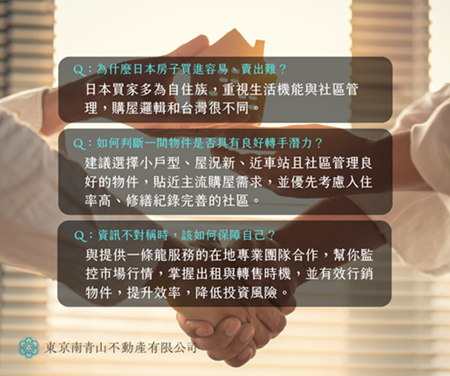
Investing in Japanese Real Estate Isn’t Impossible—But You Must Do It Right!
The most critical question when buying property in Japan isn’t “Can I rent it out?” but rather:
Who will buy this property in the future? Will they be willing to pay for it?
According to Japan’s Ministry of Land, Infrastructure, Transport and Tourism (MLIT), over 100,000 existing homes were traded in 2023. However, the vast majority of these transactions were between local Japanese residents, with foreign participation being extremely low.
This means that if you plan to resell your property in the future, your potential buyer may not be Taiwanese, but rather a Japanese person.
Anyone considering entering the Japanese real estate market should carefully consider the following three points:
What is your purpose for buying? Is it for personal use or investment?
Is the property appealing only to investors, or would Japanese residents also want to live there?
Is the community environment and reserve fund system sound? Has any maintenance been carried out?
Taiwanese vs. Japanese Homebuying Values—What’s the Difference?
Japanese people believe homes depreciate—so new homes are for living, not investing.
In Japan, the idea that “homes lose value over time” is a widely accepted belief.
Unlike in Taiwan, where people expect property to retain or even increase in value, Japanese people generally view buildings as consumables—land is the true asset.
Japanese buyers tend to purchase new homes less than 10 years old, primarily for living, not for capital appreciation.
Therefore, typical homebuyers focus on:
Whether the property is newly built
The developer’s brand and after-sales service
Commuting convenience and daily life accessibility
Japanese Investors Buy Older Homes Not as an Exception, But as a Strategy
It’s true that buildings depreciate, but as long as rental cash flow remains stable, the property is still an asset.
Japan’s tax system allows depreciation of the building portion to be counted as an expense, helping investors reduce their actual tax burden.
For investment-oriented buyers, building depreciation is actually an advantage.
As the building ages and its price drops, the purchase cost decreases. However, rent doesn’t necessarily decline at the same rate.
As long as the location is solid and tenants are stable, returns naturally improve.
That’s why many Japanese investors actively invest in older properties, especially those with:
Practical layouts
Proper management and maintenance records
Reasonable land ownership share
Stable location with rental demand
If your goal is investment, you can buy high-yield older properties—but you must also consider market acceptance.
Even if the building is old, such properties can still maintain good rental performance and asset value.
Japan’s Reserve Fund System: A High Reserve Fund Isn’t a Drawback—It’s a Resale Requirement
Japan places great importance on future maintenance planning.
Apartment residents are required to pay a monthly repair reserve fund, which is strictly allocated for long-term large-scale repairs such as exterior walls, roofing, waterproofing, and piping.
Taiwanese Buyers Often Misunderstand: “High Reserve Funds = Hard to Sell” — But in Japan, It’s the Opposite
In the Japanese market:
Properties with a history of repairs → Are seen as well-managed communities
Properties with no repair history → May be considered high-risk
So, it’s not about the amount of the reserve fund, but whether there is a long-term maintenance mindset.
High Rental Yield Doesn’t Always Mean Easy to Sell!
When investing in Japanese real estate, it’s not just about the present—you must also think about the future.
Some properties may seem attractive to investors, but may not appeal to Japanese buyers.
Understanding the differences in values between Taiwanese and Japanese buyers helps you make a sound purchase while also preparing for a smooth resale.
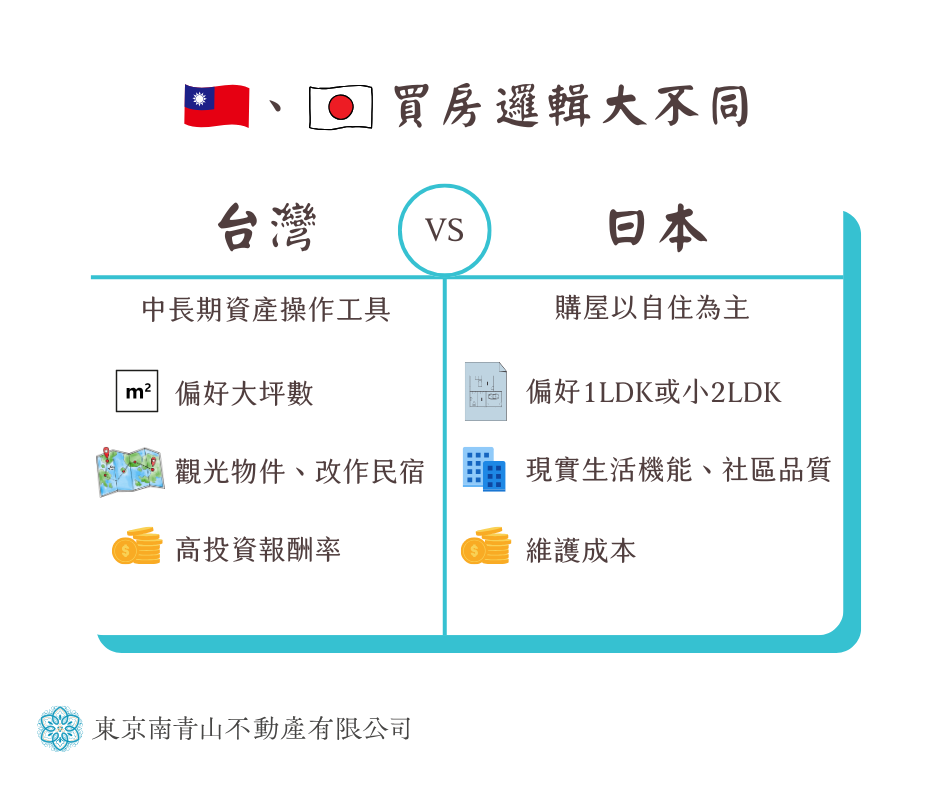
Common Pitfalls and Resale Strategies for Overseas Investors in Japan
While Japanese real estate offers advantages like stable rental income, low price volatility, and a mature system, many Taiwanese investors find that getting in is easy, but getting out is hard.
These regrets often stem from decisions that don’t align with the Japanese market context—especially since the resale market is dominated by local Japanese buyers, not foreign investors.
Here are three common pitfalls and three practical strategies to help overseas buyers prepare for a successful exit:
Pitfall 1: Buying Layouts That Don’t Match Mainstream Demand
In Taiwan, large units or properties convertible into guesthouses are often seen as high-return investments.
But in Japan, the resale market for existing homes is driven by owner-occupiers.
With a declining birthrate and aging population, household structures are shifting, and small families and singles dominate the market.
The mainstream in Japan is 1LDK to 2LDK, targeting small households and singles
Large units may seem attractive but have fewer potential buyers, leading to lower liquidity and resale interest
Unusual layouts or locations may face a demand gap and price pressure when reselling
Pitfall 2: Ignoring Community Conditions and Maintenance Records
Many overseas buyers focus on the property itself (e.g., location, yield), but for Japanese buyers, community management quality is a key decision factor.
Key points to check:
Is the reserve fund sufficient?
Is the building managed by a professional company? Is there a long-term repair plan in place?
Has the building undergone major renovations?
Is the management company professional and stable, with regular communication and transparent reporting?
In Japan, high management and reserve fees are not a negative—they’re a basic requirement.
Communities with no repair history are seen as risky, which can affect resale price and buyer confidence.
Pitfall 3: Information Gaps and Lack of Resale Channels
Even though Japan’s market is transparent, language and system differences can create information gaps for overseas investors.
Even if the property is excellent, if you:
Don’t have local resale resources
Don’t understand local buyer behavior
your property may lack visibility in the market, leading to longer resale periods or price limitations.
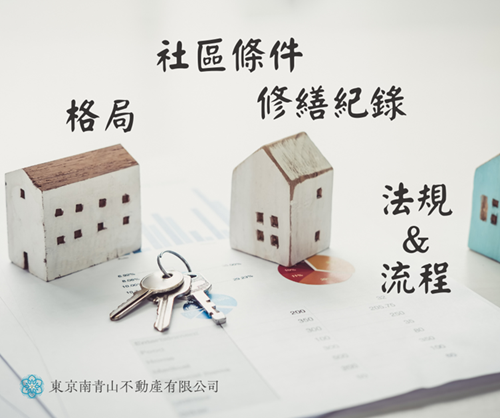
Three Key Resale Strategies for Buying Property in Japan: Reduce Risk, Increase Liquidity
Useful Tips
Tip 1: For Investor-Focused Properties, Choose Compact Units with High Market Acceptance
Properties that appeal to both owner-occupiers and investors offer the best liquidity and flexibility. Recommended features include:
• Standard layouts (1LDK or 2LDK)
• Newer buildings (within 10 years) or well-maintained older properties with clear management records
• Locations within a 10-minute walk from a train station, with full daily life amenities
These types of properties are not only easy to rent out but also attractive to Japanese homebuyers, offering dual exit strategies.
________________________________________
Tip 2: Review Community Maintenance Records and Management Conditions
Before investing, be sure to obtain and evaluate the following:
• Long-term repair plans
• Accumulated reserve fund status
• Whether a professional management company is in place
• Records of major repairs (e.g., exterior walls, common areas)
Choosing a community with strong management systems, high occupancy rates, and clear rules can significantly reduce resale risk.
________________________________________
Tip 3: Partner with Local Experts to Build a Dual Strategy: “Rental + Resale”
Working with professionals familiar with Japanese laws and market trends allows you to plan your asset strategy from the start. For example:
• Begin with rental income to establish stable cash flow
• Have a local team assist with property maintenance and market monitoring during the holding period
• Prepare resale documents and marketing strategies in advance
This approach not only increases asset flexibility but also enhances competitiveness in the secondary market.
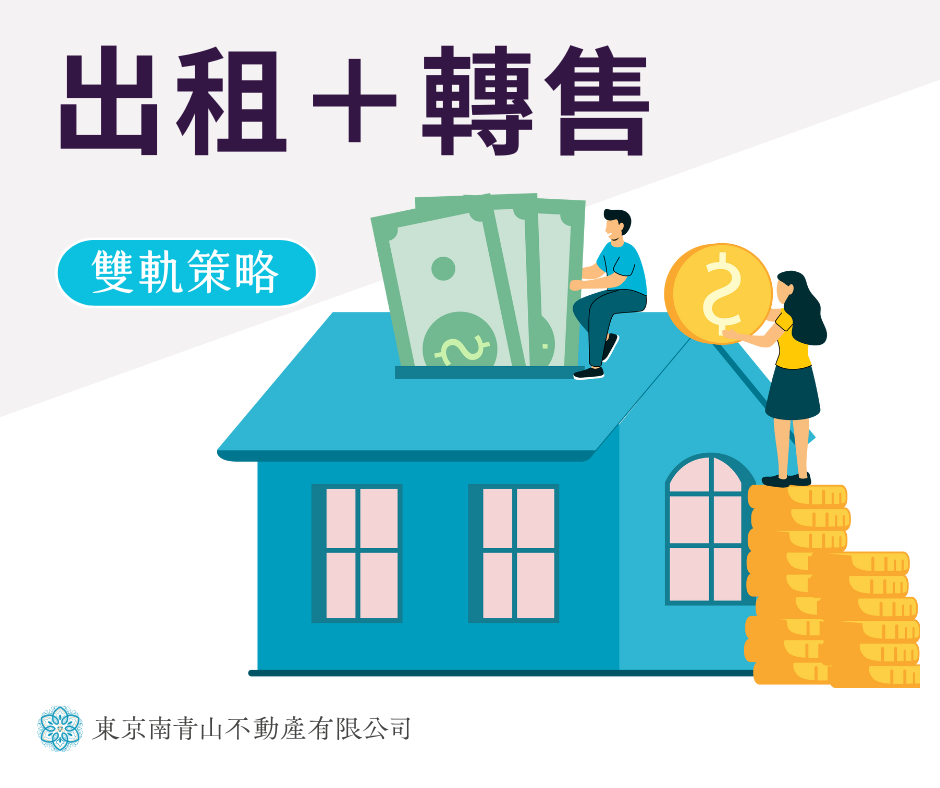
Conclusion
In Japanese real estate investment, success isn’t determined solely by rental income or purchase price.
What truly matters is whether you can exit smoothly when the time comes.
By planning your exit strategy early, understanding local market preferences, and choosing the right partners, you can ensure your investment is not only easy to enter—but also easy to exit.
If you’re considering buying property in Japan, be sure to include an exit strategy in your investment evaluation to avoid common pitfalls.
Want to learn more about life and real estate in Japan?
Subscribe to our YouTube channel for monthly updates on what you need to know about buying property in Japan, and follow our Facebook page for the latest news!





